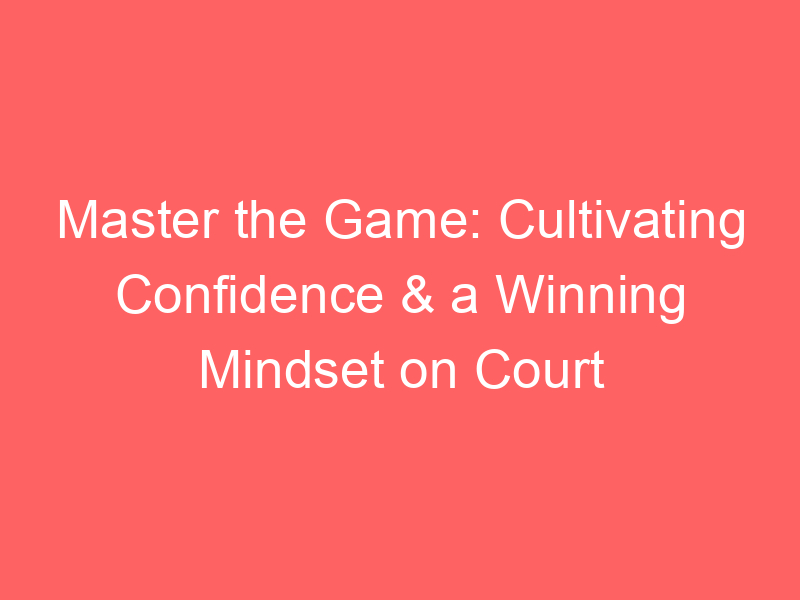
Introduction: The Importance of a Winning Mindset in Sports
Whether you’re a professional athlete or a passionate sports enthusiast, the importance of a winning mindset cannot be overstated. It’s not just about physical strength and skill; your mental game plays a crucial role too. In this article, we will delve into the concept of a winning mindset, its role in sports performance, and learn from athletes who attribute their success to a strong mindset.
- Understanding the concept of a winning mindset
- Role of mindset in sports performance
- Case study: Athletes who attribute their success to a strong mindset
A winning mindset is a state of mind that focuses on success and positive outcomes. It’s about believing in your abilities, setting goals, and working relentlessly towards them. It’s about resilience, perseverance, and the ability to bounce back from setbacks. It’s about never giving up, no matter how hard the journey gets. A winning mindset is not about winning at all costs, but about giving your best and striving for continuous improvement.
Mindset plays a pivotal role in sports performance. Athletes with a winning mindset are more likely to perform better under pressure, stay motivated during training, and recover faster from injuries. They are more focused, disciplined, and committed. They are better at handling stress, overcoming challenges, and turning failures into learning opportunities. In fact, research shows that athletes with a strong mindset are more likely to achieve their goals and reach their full potential.
Many successful athletes attribute their success to a strong mindset. For instance, Michael Jordan, one of the greatest basketball players of all time, once said, “I’ve missed more than 9000 shots in my career. I’ve lost almost 300 games. 26 times, I’ve been trusted to take the game-winning shot and missed. I’ve failed over and over and over again in my life. And that is why I succeed.” This quote perfectly encapsulates the essence of a winning mindset – it’s not about never failing, but about rising every time we fall.
In the following sections, we will explore how to believe in your abilities, sports psychology techniques for a winning mindset, and how to cultivate a winning mindset for superior court performance. Stay tuned!
Believing in Your Abilities: The Foundation of a Winning Mindset
Believing in your abilities is the cornerstone of a winning mindset. It’s the fuel that powers your determination, resilience, and ultimately, your success. Let’s delve into how you can develop this self-belief in sports.
Developing Self-Belief in Sports
Developing self-belief in sports is a journey that involves identifying your strengths, overcoming self-doubt, and building resilience in the face of adversity. Here’s how you can do it:
- Identifying your strengths
- Overcoming self-doubt
- Building resilience in the face of adversity
Every athlete has unique strengths. Maybe you’re a basketball player with a killer three-point shot, or a swimmer with an unbeatable backstroke. Identifying these strengths is the first step towards building self-belief. Keep a journal of your training sessions and games, noting down what you did well each time. This will help you recognize your strengths and boost your confidence.
Self-doubt is a common obstacle in the path to self-belief. It’s normal to question your abilities, especially when faced with a challenging opponent or a high-pressure situation. However, it’s important not to let these doubts consume you. Instead, use them as motivation to work harder and improve. Remember, every great athlete has faced doubts at some point in their career. It’s how you respond to these doubts that matters.
Sports are filled with ups and downs. One day, you might be on top of the world after a big win. The next, you might be dealing with a tough loss or an injury. Building resilience in the face of adversity is key to maintaining self-belief. When times get tough, remind yourself of your strengths and past successes. Use these as motivation to keep pushing forward, no matter what obstacles you face.
In conclusion, believing in your abilities is a crucial part of developing a winning mindset in sports. By identifying your strengths, overcoming self-doubt, and building resilience, you can cultivate a strong belief in your abilities and achieve your full potential on the court.
Boosting Court Performance through Confidence
Confidence is a crucial element in sports, particularly in court games such as tennis, basketball, and volleyball. It can significantly impact your performance and can be the difference between winning and losing. Let’s delve into how confidence affects your game, techniques for building it, and real-life examples of confidence boosting court performance.
- How Confidence Affects Your Game
- Techniques for Building Confidence on the Court
- Positive Self-Talk: Encourage yourself with positive statements. Instead of saying “I can’t do this,” say “I can do this.”
- Visualization: Imagine yourself performing well on the court. This can help build confidence and reduce anxiety.
- Goal Setting: Set realistic and achievable goals. Meeting these goals can boost your confidence.
- Practice: The more you practice, the more confident you’ll become in your abilities.
- Real-Life Examples of Confidence Boosting Court Performance
Confidence can be a game-changer in sports. When athletes are confident, they are more likely to take calculated risks, make decisive moves, and perform at their best. They trust their abilities and are not afraid of making mistakes. This mindset allows them to play more freely and assertively, which can lead to better performance on the court. According to a study by the Association for Applied Sport Psychology, athletes with high self-confidence are more likely to set challenging goals, maintain a positive mindset, and cope better with stress.
Building confidence is not an overnight process. It requires consistent effort and practice. Here are some techniques that can help:
Many successful athletes have attributed their success to confidence. For instance, Serena Williams, one of the greatest tennis players of all time, once said, “I always believe I can beat the best, achieve the best. I always see myself in the top position.” This shows how her confidence has played a pivotal role in her success.
In conclusion, confidence is a powerful tool that can significantly boost your court performance. By understanding its impact, employing techniques to build it, and drawing inspiration from successful athletes, you can enhance your game and achieve your sporting goals.
Sports Psychology Techniques for a Winning Mindset
Every athlete, regardless of their level, can benefit from developing a winning mindset. This mindset can be cultivated through various sports psychology techniques. Let’s delve into some of these techniques that can help athletes improve their performance and maintain a winning mentality.
Mindset Training for Athletes
Training the mind is as crucial as training the body. Here are some effective mindset training techniques:
- Visualization Techniques
- Goal Setting for Performance Improvement
- Positive Self-Talk for Maintaining a Winning Mentality
Visualization is a powerful tool in sports psychology. It involves creating a mental image of what you want to happen or the action you want to take. For example, a basketball player might visualize making the perfect shot, while a runner might visualize crossing the finish line first. Visualization helps athletes to focus, reduce anxiety, and improve performance.
Setting specific, measurable, achievable, relevant, and time-bound (SMART) goals can significantly improve an athlete’s performance. Goals give direction to your training and motivation to push through even the most challenging workouts. They also provide a clear measure of progress, which can boost confidence and maintain a winning mentality.
Positive self-talk involves replacing negative thoughts with positive ones. It’s about telling yourself “I can do this” instead of “I can’t”. This technique helps athletes to overcome self-doubt, stay motivated, and perform at their best. Remember, your mind believes what you tell it, so make sure you’re telling it positive, empowering messages.
These techniques are not just for professional athletes. Anyone who wants to improve their performance in sports or any other area of life can benefit from them. So, start training your mind today and see the difference it can make!
Enhancing Sports Mindset through Mental Toughness
One of the key aspects of a winning sports mindset is mental toughness. This is the ability to stay focused, confident, and determined, even when the odds are against you. Let’s delve into this crucial topic.
- Understanding Mental Toughness in Sports
- Strategies for Developing Mental Toughness
- Goal Setting: Setting clear, achievable goals can help you stay focused and motivated.
- Positive Self-Talk: Encouraging yourself with positive statements can boost your confidence and reduce stress.
- Visualization: Visualizing success can help you prepare for actual performance.
- Resilience Training: Learning to bounce back from setbacks can strengthen your mental toughness.
- Case Study: Athletes Who Have Shown Exceptional Mental Toughness
Mental toughness in sports refers to an athlete’s ability to perform consistently under varying conditions and pressures. It’s about maintaining focus, confidence, and emotional control, regardless of the challenges faced. It’s not just about physical strength; it’s about the strength of mind and character.
Developing mental toughness requires practice and dedication. Here are a few strategies that can help:
Many athletes have shown exceptional mental toughness. One such example is Michael Jordan, a renowned basketball player. Despite facing numerous obstacles in his career, Jordan’s mental toughness allowed him to overcome them and become one of the greatest players in the history of basketball.
Developing mental toughness is a journey, not a destination. It requires continuous effort and commitment. But with the right strategies and mindset, you can enhance your sports performance and achieve your goals.
Conclusion: Cultivating a Winning Mindset for Superior Court Performance
As we wrap up our discussion on the importance of a winning mindset in sports, let’s take a moment to revisit the key points we’ve covered. The journey to superior court performance is a continuous one, and it all starts with the right mindset.
- Recap of key techniques for mindset development
- Importance of continuous mindset training
- Final thoughts on the power of a winning mindset in sports
The journey to a winning mindset begins with believing in your abilities. This is the foundation upon which all other mindset development techniques are built. Techniques such as visualization, goal setting, and positive self-talk are all crucial tools in the athlete’s mindset toolbox. For example, visualization allows athletes to mentally rehearse their performance, which can boost confidence and reduce anxiety. Goal setting, on the other hand, provides a clear direction and helps athletes stay focused and motivated.
Just like physical training, mindset training is not a one-time event. It requires consistent practice and reinforcement. Athletes who regularly train their minds are more likely to stay motivated, handle pressure effectively, and perform at their best when it matters most. In fact, a study by the American Psychological Association found that athletes who engaged in regular mental training demonstrated improved performance and greater resilience.
In conclusion, a winning mindset is a powerful tool in sports. It can be the difference between a good performance and a great one. It can help athletes overcome challenges, bounce back from setbacks, and reach their full potential. As legendary basketball coach Phil Jackson once said, “The strength of the team is each individual member. The strength of each member is the team.” This perfectly encapsulates the power of a winning mindset – it not only benefits the individual athlete but also contributes to the success of the team as a whole.
Remember, cultivating a winning mindset is a journey, not a destination. So keep practicing, keep believing, and keep pushing your limits. The court is yours for the taking!






